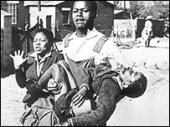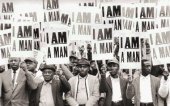Hey Nelly Nelly, come to the window
Hey Nelly Nelly look at what I see
He's riding into town on a sway back mule
Got a tall black hat and he looks like a fool
He sure is talkin' like he's been to school
And it's 1853 [1]
Hey Nelly Nelly, listen what he's sayin'
Hey Nelly Nelly, he says it's gettin' late
And he says them black folks should all be free
To walk around the same as you and me
He's talkin' 'bout a thing he calls democracy
And it's 1858 [2]
Hey Nelly Nelly hear the band a playing
Hey Nelly Nelly, hand me down my gun
"Cause the men are cheerin' and the boys are too
They're all puttin' on their coats of blue
I can't sit around here and talk to you
'Cause it's 1861 [3]
Hey Nelly Nelly, now the fightin' is over
Hey Nelly Nelly, I've come back alive
My coat of blue is stained with red
And the man in the tall black hat is dead
We sure will remember all the things he said
In 1865 [4]
Hey Nelly Nelly, come to the window
Hey Nelly Nelly, look at what I see
I see white folks and colored walkin' side by side
They're walkin' in a column that's a century wide
It's still a long and a hard and a bloody ride
In 1963 [5]
[Hey Nellie Nellie, come to the window
Hey Nellie Nellie, time to make a row
I see white folk and black folk side by side
Marching in a column a century wide
From Selma to Soweto we're turning the tide
I feel things changing now
From Selma to Soweto we're turning the tide
Things are changing now]
Hey Nelly Nelly look at what I see
He's riding into town on a sway back mule
Got a tall black hat and he looks like a fool
He sure is talkin' like he's been to school
And it's 1853 [1]
Hey Nelly Nelly, listen what he's sayin'
Hey Nelly Nelly, he says it's gettin' late
And he says them black folks should all be free
To walk around the same as you and me
He's talkin' 'bout a thing he calls democracy
And it's 1858 [2]
Hey Nelly Nelly hear the band a playing
Hey Nelly Nelly, hand me down my gun
"Cause the men are cheerin' and the boys are too
They're all puttin' on their coats of blue
I can't sit around here and talk to you
'Cause it's 1861 [3]
Hey Nelly Nelly, now the fightin' is over
Hey Nelly Nelly, I've come back alive
My coat of blue is stained with red
And the man in the tall black hat is dead
We sure will remember all the things he said
In 1865 [4]
Hey Nelly Nelly, come to the window
Hey Nelly Nelly, look at what I see
I see white folks and colored walkin' side by side
They're walkin' in a column that's a century wide
It's still a long and a hard and a bloody ride
In 1963 [5]
[Hey Nellie Nellie, come to the window
Hey Nellie Nellie, time to make a row
I see white folk and black folk side by side
Marching in a column a century wide
From Selma to Soweto we're turning the tide
I feel things changing now
From Selma to Soweto we're turning the tide
Things are changing now]
Note:
[1] 1855. Si sta preparando la guerra civile. In Kansas già si scontrano le milizie abolizioniste di John Brown con i cosiddetti “Border Ruffians” schiavisti.
[2] 1859. Anno della cattura ed impiccagione di John Brown, dopo un fallito tentativo di ribellione degli schiavi che il militante abolizionista cerca di suscitare con l’incursione all’arsenale militare di Harpers Ferry in Virginia.
[3] 1861. Scoppio della guerra civile americana.
[4] 1865. Fine della guerra civile americana e assassinio del presidente Abraham Lincoln ad opera di John Wilkes Booth, simpatizzante della Confederazione e fervente anti-abolizionista.
[5] Il 1963 è l’anno in cui George C. Wallace, insediandosi a governatore dell’Alabama, dichiara : “Segregazione adesso, segregazione domani e segregazione sempre!”… Il 12 giugno viene assassinato Medgar Evers… Poi il massacro di Birmingham.
Ma il 1963 è anche l’anno in cui ha inizio la “Birmingham campaign” organizzata dal movimento del reverendo King per mostrare agli occhi del mondo l’oppressione di cui sono vittime i neri d’America… E in agosto James Meredith è il primo nero a laurearsi all’università del Mississippi, mentre Martin Luther King pronuncia il suo celebre discorso I Have A Dream durante la grande “March on Washington for Jobs and Freedom”…
[1] 1855. Si sta preparando la guerra civile. In Kansas già si scontrano le milizie abolizioniste di John Brown con i cosiddetti “Border Ruffians” schiavisti.
[2] 1859. Anno della cattura ed impiccagione di John Brown, dopo un fallito tentativo di ribellione degli schiavi che il militante abolizionista cerca di suscitare con l’incursione all’arsenale militare di Harpers Ferry in Virginia.
[3] 1861. Scoppio della guerra civile americana.
[4] 1865. Fine della guerra civile americana e assassinio del presidente Abraham Lincoln ad opera di John Wilkes Booth, simpatizzante della Confederazione e fervente anti-abolizionista.
[5] Il 1963 è l’anno in cui George C. Wallace, insediandosi a governatore dell’Alabama, dichiara : “Segregazione adesso, segregazione domani e segregazione sempre!”… Il 12 giugno viene assassinato Medgar Evers… Poi il massacro di Birmingham.
Ma il 1963 è anche l’anno in cui ha inizio la “Birmingham campaign” organizzata dal movimento del reverendo King per mostrare agli occhi del mondo l’oppressione di cui sono vittime i neri d’America… E in agosto James Meredith è il primo nero a laurearsi all’università del Mississippi, mentre Martin Luther King pronuncia il suo celebre discorso I Have A Dream durante la grande “March on Washington for Jobs and Freedom”…
inviata da Alessandro - 19/9/2009 - 16:37
Una postilla relativa a Lincoln, il padre degli USA moderni…
Il razzismo sanguinario ed il segregazionismo feroce che permasero dopo l’abolizione della schiavitù e la guerra civile sono in realtà un diretto portato dell’ideologia sottesa all’abolizionismo sette-ottocentesco:
Il razzismo sanguinario ed il segregazionismo feroce che permasero dopo l’abolizione della schiavitù e la guerra civile sono in realtà un diretto portato dell’ideologia sottesa all’abolizionismo sette-ottocentesco:
“I am not, nor ever have been, in favor of bringing about in any way the social and political equality of the white and black races, that I am not nor ever have been in favor of making voters or jurors of negroes, nor of qualifying them to hold office, nor to intermarry with white people; and I will say in addition to this that there is a physical difference between the white and black races which I believe will forever forbid the two races living together on terms of social and political equality. And inasmuch as they cannot so live, while they do remain together there must be the position of superior and inferior, and I as much as any other man am in favor of having the superior position assigned to the white race. I say upon this occasion I do not perceive that because the white man is to have the superior position the negro should be denied everything. I do not understand that because I do not want a negro woman for a slave I must necessarily want her for a wife.” (Abraham Lincoln, during the Lincoln–Douglas debates of 1858)
Alessandro - 26/4/2010 - 15:44
Lingua: Spagnolo
Versione spagnola di Gustavo Sierra Fernandez
EH NELLY NELLY
Eh Nelly Nelly, ven a la ventana
Eh Nelly Nelly, mira lo que veo
Está cabalgando hacia la ciudad a lomos de una mula bamboleante
Tiene un alto sombrero negro y parece un tonto
Se cree que habla como si estuviera en el colegio
y es 1853 [1]
Eh Nelly Nelly, escucha lo que dice
Eh Nelly Nelly, dice que se hace tarde
y les dice a la gente negra que todos deberían ser libres
de andar por ahí lo mismo que tú y yo
Habla sobre una cosa que llama democracia
y es 1858. [2]
Eh Nelly Nelly, oye a la banda tocar
Eh Nelly Nelly, alcánzame mi arma
porque los hombres están alentando y los chicos también
Están todos poniéndose sus abrigos azules
No puedo sentarme por aquí y hablarte,
porque es 1861. [3]
Eh Nelly Nelly, la lucha ya ha terminado
Eh Nelly Nelly, he vuelto vivo
Mi abrigo azul está manchado de rojo
y el hombre con el alto sombrero negro está muerto
Seguramente recordaremos todas las cosas que dijo
en 1865. [4]
Eh Nelly Nelly, ven a la ventana
Eh Nelly Nelly, mira lo que veo
Veo gente blanca y de color caminando hombro con hombro
Caminan en una columna que es como toda una centuria
Todavía es un largo y duro y sangriento paseo
en 1963. [5]
[Eh Nelly Nelly, ven a la ventana
Eh Nelly Nelly, es hora de hacer una fila
Veo gente blanca y negra hombro con hombro
marchando en una columna como toda una centuria
desde Selma a Soweto estamos cambiando el curso
Siento las cosas cambiando ya
Desde Selma a Soweto estamos cambiando el curso
Las cosas están cambiando ya.]
Eh Nelly Nelly, ven a la ventana
Eh Nelly Nelly, mira lo que veo
Está cabalgando hacia la ciudad a lomos de una mula bamboleante
Tiene un alto sombrero negro y parece un tonto
Se cree que habla como si estuviera en el colegio
y es 1853 [1]
Eh Nelly Nelly, escucha lo que dice
Eh Nelly Nelly, dice que se hace tarde
y les dice a la gente negra que todos deberían ser libres
de andar por ahí lo mismo que tú y yo
Habla sobre una cosa que llama democracia
y es 1858. [2]
Eh Nelly Nelly, oye a la banda tocar
Eh Nelly Nelly, alcánzame mi arma
porque los hombres están alentando y los chicos también
Están todos poniéndose sus abrigos azules
No puedo sentarme por aquí y hablarte,
porque es 1861. [3]
Eh Nelly Nelly, la lucha ya ha terminado
Eh Nelly Nelly, he vuelto vivo
Mi abrigo azul está manchado de rojo
y el hombre con el alto sombrero negro está muerto
Seguramente recordaremos todas las cosas que dijo
en 1865. [4]
Eh Nelly Nelly, ven a la ventana
Eh Nelly Nelly, mira lo que veo
Veo gente blanca y de color caminando hombro con hombro
Caminan en una columna que es como toda una centuria
Todavía es un largo y duro y sangriento paseo
en 1963. [5]
[Eh Nelly Nelly, ven a la ventana
Eh Nelly Nelly, es hora de hacer una fila
Veo gente blanca y negra hombro con hombro
marchando en una columna como toda una centuria
desde Selma a Soweto estamos cambiando el curso
Siento las cosas cambiando ya
Desde Selma a Soweto estamos cambiando el curso
Las cosas están cambiando ya.]
NOTAS
* Los amigos de Canzoni…, escribieron “Come to the window”, pero al escuchar la versión que podéis oír aquí, me he dado cuenta que dice “now the fight is over”. Ignoro qué es lo que canta en el disco original Judy Collins 3, pues no lo tengo; pero tendría cierta lógica que la primera estrofa y la última fueran las únicas que comenzaran de la misma manera: asomándose a la ventana para ver, en 1853, a Abraham Lincoln, y en 1963 a Martin Luther King (aunque la canción no le nombre).
[LAS SIGUIENTES NOTAS SON TRADUCCIÓN DE LAS NOTAS ELABORADAS POR CANZONI…]
[1] 1855. Se está preparando la guerra civil. En Kansas ya hay choques de las milicias abolicionistas de John Brown con los llamados “Border Ruffians” [Rufianes de la Frontera] esclavistas.
[2] 1859. Año de la captura y ejecución de John Brown, tras un intento fallido de rebelión de los esclavos que el militante abolicionista busca suscitar con la incursión al arsenal militar de Harpers Ferry en Virginia.
[3] 1861. Inicio de la guerra civil americana.
[4] 1865. Final de la guerra y asesinato de Lincoln en la ópera por John Wilkes Booth, simpatizante de la Confederación y ferviente anti-abolicionista.
[5] 1963 es el año en el que George C. Wallace, estableciéndose como gobernador de Alabama, diría “¡Segregación ahora, segregación mañana, y segregación siempre!”… El 12 de junio es asesinado Medgar Evers… Después, masacre de Birmingham, Alabama [en donde resultaron muertas por la violencia policial cuatro chicas negras]. Pero 1963 es también el año en que comienza la “Campaña Birmingham”, organizada por el movimiento del reverendo King, para mostrar a los ojos del mundo la opresión de la que son víctimas los negros en América… Y en agosto, James Meredith es el primer negro en graduarse en la Universidad de Mississippi, mientras Martin Luther King pronuncia su célebre discurso “I have a dream” durante la gran Marcha a Washington por el Empleo y la Libertad.
* Los amigos de Canzoni…, escribieron “Come to the window”, pero al escuchar la versión que podéis oír aquí, me he dado cuenta que dice “now the fight is over”. Ignoro qué es lo que canta en el disco original Judy Collins 3, pues no lo tengo; pero tendría cierta lógica que la primera estrofa y la última fueran las únicas que comenzaran de la misma manera: asomándose a la ventana para ver, en 1853, a Abraham Lincoln, y en 1963 a Martin Luther King (aunque la canción no le nombre).
[LAS SIGUIENTES NOTAS SON TRADUCCIÓN DE LAS NOTAS ELABORADAS POR CANZONI…]
[1] 1855. Se está preparando la guerra civil. En Kansas ya hay choques de las milicias abolicionistas de John Brown con los llamados “Border Ruffians” [Rufianes de la Frontera] esclavistas.
[2] 1859. Año de la captura y ejecución de John Brown, tras un intento fallido de rebelión de los esclavos que el militante abolicionista busca suscitar con la incursión al arsenal militar de Harpers Ferry en Virginia.
[3] 1861. Inicio de la guerra civil americana.
[4] 1865. Final de la guerra y asesinato de Lincoln en la ópera por John Wilkes Booth, simpatizante de la Confederación y ferviente anti-abolicionista.
[5] 1963 es el año en el que George C. Wallace, estableciéndose como gobernador de Alabama, diría “¡Segregación ahora, segregación mañana, y segregación siempre!”… El 12 de junio es asesinado Medgar Evers… Después, masacre de Birmingham, Alabama [en donde resultaron muertas por la violencia policial cuatro chicas negras]. Pero 1963 es también el año en que comienza la “Campaña Birmingham”, organizada por el movimiento del reverendo King, para mostrar a los ojos del mundo la opresión de la que son víctimas los negros en América… Y en agosto, James Meredith es el primer negro en graduarse en la Universidad de Mississippi, mientras Martin Luther King pronuncia su célebre discurso “I have a dream” durante la gran Marcha a Washington por el Empleo y la Libertad.
Come faceva notare a suo tempo Gustavo nella quarta strofa (quella del 1865) almeno nelle versioni disponibili nei video Judy Collins canta "now the fightin' is over" and non "come to the window". Ho corretto il testo di conseguenza.
Lorenzo - 23/1/2018 - 22:19
×
![]()









Album "Judy Collins #3"
Scritta da Shel Silverstein e Jim Friedman.
In una canzone, tutta la storia dell'emancipazione dei neri d'America.
Proposta anche dai musicisti scozzesi Iain MacKintosh e Hamish Imlach che aggiunsero un'ultima strofa dedicata all'analoga, vincente lotta dei neri contro il regime dell'apartheid in Sudafrica.